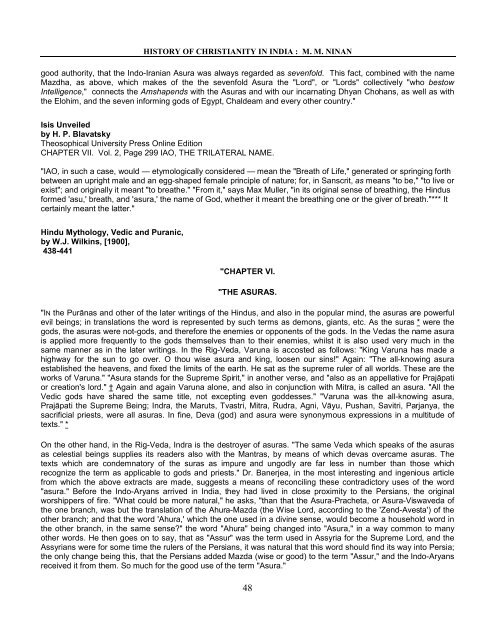Indian Christianity
Create successful ePaper yourself
Turn your PDF publications into a flip-book with our unique Google optimized e-Paper software.
HISTORY OF CHRISTIANITY IN INDIA : M. M. NINAN<br />
good authority, that the Indo-Iranian Asura was always regarded as sevenfold. This fact, combined with the name<br />
Mazdha, as above, which makes of the the sevenfold Asura the "Lord", or "Lords" collectively "who bestow<br />
Intelligence," connects the Amshapends with the Asuras and with our incarnating Dhyan Chohans, as well as with<br />
the Elohim, and the seven informing gods of Egypt, Chaldeam and every other country."<br />
Isis Unveiled<br />
by H. P. Blavatsky<br />
Theosophical University Press Online Edition<br />
CHAPTER VII. Vol. 2, Page 299 IAO, THE TRILATERAL NAME.<br />
"IAO, in such a case, would — etymologically considered — mean the "Breath of Life," generated or springing forth<br />
between an upright male and an egg-shaped female principle of nature; for, in Sanscrit, as means "to be," "to live or<br />
exist"; and originally it meant "to breathe." "From it," says Max Muller, "in its original sense of breathing, the Hindus<br />
formed 'asu,' breath, and 'asura,' the name of God, whether it meant the breathing one or the giver of breath."*** It<br />
certainly meant the latter."<br />
Hindu Mythology, Vedic and Puranic,<br />
by W.J. Wilkins, [1900],<br />
438-441<br />
"CHAPTER VI.<br />
"THE ASURAS.<br />
"IN the Purānas and other of the later writings of the Hindus, and also in the popular mind, the asuras are powerful<br />
evil beings; in translations the word is represented by such terms as demons, giants, etc. As the suras * were the<br />
gods, the asuras were not-gods, and therefore the enemies or opponents of the gods. In the Vedas the name asura<br />
is applied more frequently to the gods themselves than to their enemies, whilst it is also used very much in the<br />
same manner as in the later writings. In the Rig-Veda, Varuna is accosted as follows: "King Varuna has made a<br />
highway for the sun to go over. O thou wise asura and king, loosen our sins!" Again: "The all-knowing asura<br />
established the heavens, and fixed the limits of the earth. He sat as the supreme ruler of all worlds. These are the<br />
works of Varuna." "Asura stands for the Supreme Spirit," in another verse, and "also as an appellative for Prajāpati<br />
or creation's lord." † Again and again Varuna alone, and also in conjunction with Mitra, is called an asura. "All the<br />
Vedic gods have shared the same title, not excepting even goddesses." "Varuna was the all-knowing asura,<br />
Prajāpati the Supreme Being; Indra, the Maruts, Tvastri, Mitra, Rudra, Agni, Vāyu, Pushan, Savitri, Parjanya, the<br />
sacrificial priests, were all asuras. In fine, Deva (god) and asura were synonymous expressions in a multitude of<br />
texts." *<br />
On the other hand, in the Rig-Veda, Indra is the destroyer of asuras. "The same Veda which speaks of the asuras<br />
as celestial beings supplies its readers also with the Mantras, by means of which devas overcame asuras. The<br />
texts which are condemnatory of the suras as impure and ungodly are far less in number than those which<br />
recognize the term as applicable to gods and priests." Dr. Banerjea, in the most interesting and ingenious article<br />
from which the above extracts are made, suggests a means of reconciling these contradictory uses of the word<br />
"asura." Before the Indo-Aryans arrived in India, they had lived in close proximity to the Persians, the original<br />
worshippers of fire. "What could be more natural," he asks, "than that the Asura-Pracheta, or Asura-Viswaveda of<br />
the one branch, was but the translation of the Ahura-Mazda (the Wise Lord, according to the 'Zend-Avesta') of the<br />
other branch; and that the word 'Ahura,' which the one used in a divine sense, would become a household word in<br />
the other branch, in the same sense?" the word "Ahura" being changed into "Asura," in a way common to many<br />
other words. He then goes on to say, that as "Assur" was the term used in Assyria for the Supreme Lord, and the<br />
Assyrians were for some time the rulers of the Persians, it was natural that this word should find its way into Persia;<br />
the only change being this, that the Persians added Mazda (wise or good) to the term "Assur," and the Indo-Aryans<br />
received it from them. So much for the good use of the term "Asura."<br />
48


















